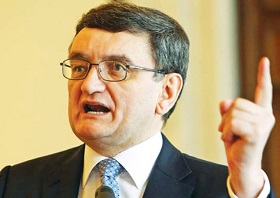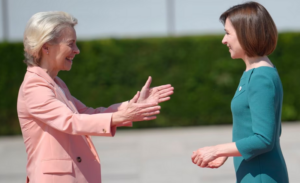 So it begins / Ombudsman challenges in the CCR law banning offenders to lead Romania. „Indignation” for the Presidency: it opens the door for convicts to take decisions
So it begins / Ombudsman challenges in the CCR law banning offenders to lead Romania. „Indignation” for the Presidency: it opens the door for convicts to take decisions
The Ombudsman filed a notice to the CCR, Thursday, on the unconstitutionality of art. 2 of Law 90/2001 that does not allow criminal convicts to hold a minister positions – consequently, it does not allow Liviu Dragnea to be prime minister, neither minister, because of the definitive because of the definitive suspended conviction.
The main reason of the notice: the law would violate the principle of checks and balances of powers in a state.
What the respective article of the law says:
Accession to the Government as a member is open to the persons who have only Romanian citizenship and residence in the country, enjoy the exercise of electoral rights, have no criminal convictions and are not in any of the incompatibility situations stipulated in art. 4 paragraph (1).
Arguments of the notice
- Lack of legislative consistency, even within the same power of the state – Law for the election of the President (part of the executive power) does not provide for the impossibility to elect a convicted person to this position and for the MPs (legislative power), the mandate is not conditional on this matter unless the court has decided a complementary penalty involving the electoral rights. Firm interdiction exists in the case of magistrates (judicial power)
- Lack of predictability of the wording ” have no criminal convictions”. It can allow various interpretations
- Lack of a differential legal treatment – between convicts who committed offenses intentionally and those convicted of negligence, which leads to violating certain civil and political rights. For instance, article 21 section 2 of the Universal Declaration of Human Rights stating that „any person has the right to access, on an equal basis, to the public functions in her country.”
- Legislation must meet the constitutional principle of checks and balances of powers, and this balance cannot be achieved unless there is a consistent system designed to ensure generally applicable integrity requirements in exercising the functions from these three powers
Presidency’s reaction: It can open the gate to sentenced criminals to lead
„Romanian President is outraged by the action of the Ombudsman from this morning, an action having a single beneficiary. Romanian President is surprised by how quickly the Ombudsman is willing to be useful to the new majority,” said Thursday the President’s spokesperson, Madalina Dobrovolschi.
She explained that the efforts of a sentenced person willing to become prime minister are not part of the Ombudsman’s duty.
By this notice in the Constitutional Court, the Ombudsman „can open the gate to sentenced criminals to lead,” she also added.
„Nobody, ever, considered that this criterion of morality is a problem for the political life in Romania” and for 16 years “the Ombudsman has not considered that the text of the law is a matter for civil rights and freedoms”, said the spokesperson of the Romanian Presidency.
Dobrovolschi cited article 58 paragraph 1 of the Constitution which clearly states that the role of the Ombudsman is to „defend the rights and freedoms of natural persons,” and explained that „the efforts of a convicted person to become prime minister falls outside the agenda” belonging to Victor Ciorbea.
Ombudsman Victor Ciorbea: 5 notices in 2016
This is the first notice of unconstitutionality filed to the CCR this year by the Ombudsman and, if accepted, would allow Liviu Dragnea to become prime minister.
Dragnea’s intention to take over this position has been expressed within a statement at the nomination of Sevil Shhaideh:
„According to the usages from us and other civilized countries, I had the right to ask the mandate for me, as PSD won the election. At the same time, I took into account two things: President’s statements and a law currently in force. I do not wish to ask for this function, for now.”
During the past year, the institution challenged in the Constitutional Court only five provisions:
March – the Ombudsman notified the Constitutional Court on the exception of unconstitutionality related to the Emergency Ordinance 17/2010 for completing Title XI „Agricultural life annuity” of Law no. 247/2005 on the reform of property and justice, on the grounds that an article has been added contrary to the principle of non-retroactivity of the law. The Ombudsman considered that the person is required, on 5 March 2010, to have a certain conduct, even before the emergency ordinance comes into force, which was not provided for by the existing norm at the time, namely to have filed for obtaining the agricultural life annuity by 31 December 2009, inclusive.
May – the Ombudsman filed a notice to the CCR on the emergency ordinance allowing for a referendum to be organised simultaneously with local elections. The notice followed a request from PSD that was willing to block the referendum on the unification of Sinmartin village with Oradea city.
July – Exception of constitutionality relating to the protection zones existing on both sides of the road safety areas. According to the Government Ordinance 43/1997, republished, they remain under the management of the legal persons or individuals who administer or own them. These owners pay tax at the rate of 100% on the land, although they would hardly be able to use it, and even more, they have certain restrictions in this regard, with high obligations imposed on them, as the owners of the land, which may become onerous. This would harm the lawful private interests of the owners.
November – the Ombudsman filed a noticed to the Constitutional Court on some legal provisions regarding the patient’s electronic health record that do not guarantee enough protection of the right to intimate, family and private life. The Ombudsman considered that the access and use of data from the electronic health record of the patient must be done under maximum security conditions, to preclude dissemination (even accidental) of any personal data that could prejudice a person in any way.
December – the objection of unconstitutionality on a provision of the Tax Code requiring a person who no longer owns a good to pay tax on construction, land or means of transport. This respective provision forces the person who was the owner of that good at 31 December, in the preceding fiscal year, to pay this tax, which the Ombudsman considered to be inadequate and disproportionate to the aim set, as it affects the personal property of the taxpayers.
Important unconstitutional laws that Victor Ciorbea refused to challenge
In 2014, Ciorbea stubbornly refused to challenge the famous Ordinance 55, called the ordinance of migration, which temporarily suspended the sanction on the local elected officials joining a different party than the one with which they had submitted their candidacies and got elected to their position. PSD wanted to recover this way the mayors lost following the dissolution of USL.
The opposition parties, President Traian Basescu and NGOs asked him to challenge the ordinance in the CCR and the US Embassy also showed concern about the timing of issuing such a law (it was before the presidential elections).
NGOs and the opposition even picketed against the institution, but Victor Ciorbea answered to the protests by claiming that the action „particularly refers to the relationship between the public authorities, aspects of the functioning of the constitutional democracy involving an especially political analysis and approach”, which would ask for the institution „to go beyond its position of neutrality and objectivity and involve in partisan controversies.”
The emergency ordinance has been declared unconstitutional, but following a notice from PNL. In the short period of its applicability, hundreds of liberal and PDL mayors have transferred to PSD.
Also in 2014, Victor Ciorbea denied the appeal from the civil society, a part of media and the President, to challenge the changes made by the former Minister Sorin Campeanu on the Education Law.
Among the provisions of this ordinance, there were several references to PhDs. For instance, the emergency ordinance included an article providing for the possibility of giving up the title, which would have allowed plagiarists to go without the penalty for the intellectual fraud they committed.
Right after the publication of the ordinance, Victor Ponta sent a statement to the Ministry of Education announcing that he gives up his title. The request remained unanswered as the rules for the application of the ordinance have not been drafted anymore.
A PNL member, Victor Ciorbea was nominated by PSD for the Ombudsman position
Victor Ciorbea was voted for the Ombudsman position in 2014, following the nomination made by PSD, although he was a PNL member at the time.
The liberals did not agree with the nomination and left the plenary hall when the vote took place.
A former union leader in the early 90s, Ciorbea joined politics at the time of the Democratic Convention’s establishment.
He was the mayor of the capital city and prime minister (between 12 December 1996 and 30 March 1998).
In 2011, he was elected chairman of PNTCD, but transferred to PNL following the internal scandals from this party and obtained a parliamentary term in the Senate on the PNL lists, in 2012.









